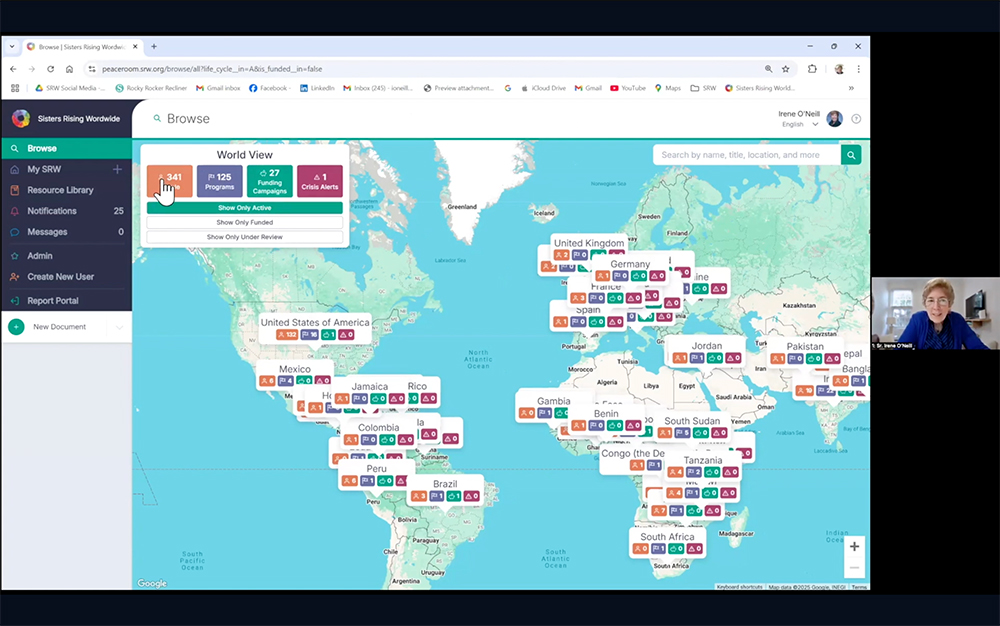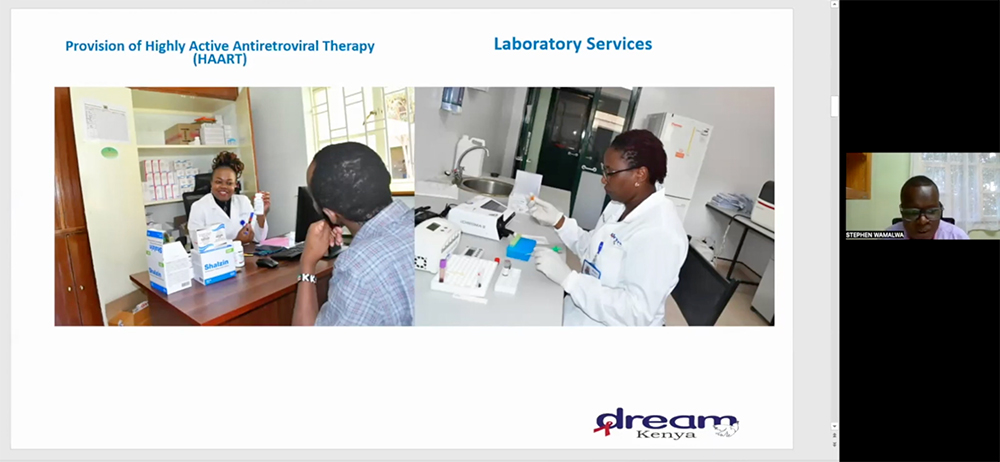
Sr. Florence Muia, an Assumption Sister of Nairobi who established Upendo Village in Kenya, discussed the challenges and successes of working in HIV/AIDS care during the Feb. 11 "Raising Resources for Healing Ministries" webinar. (GSR screenshot)
For more resources related to the health care forum that Global Sisters Report hosted, including recordings of the presentations, click here.
On Feb. 11, in honor of the World Day of the Sick and the feast of Our Lady of Lourdes, Global Sisters Report, in partnership with the All-Africa Conference: Sister to Sister, hosted a webinar aimed at assisting religious sisters who are essential to health care in Africa. The webinar provided resources to support their ongoing efforts in the health care field.
"Raising Resources for Healing Ministries" gathered religious sisters and a network of organizations and experts dedicated to supporting health care ministries.
More than 600 million people in Africa lack access to basic health care services, according to the U.S. International Development Finance Corporation. Additionally, health spending on the continent is inadequate to meet the increasing health care demands. The financial institution states that while Africa represents over 16% of the world's population and bears 23% of the global disease burden, it accounts for only 1% of annual global spending on health.
Other problems facing the health sector on the continent include inadequate human resources, a lack of political will, corruption within the health care system, and insufficient training and education for health care workers.
The Development Finance Corporation indicates that epidemics, particularly those that disproportionately affect Africa, have significantly contributed to this situation. The HIV/AIDS epidemic has impacted sub-Saharan Africa more severely than any other region in the world.
During the webinar, the panel discussed several key topics, including innovative fundraising techniques, effective use of grants, and practical strategies for securing medical supplies and medications. Most importantly, participants learned the significance of establishing partnerships with other Catholic health care organizations. Attendees gained insights into obtaining vital resources and support, enabling them to sustain and expand their life-saving work within the community.
"Through this webinar, we aim to enhance the collaborative network for sisters, helping them learn how to sustain their health care ministry and reassuring them that they are not alone," said Sr. Eneless Chimbali, a member of the Servants of the Blessed Virgin Mary and a senior program officer for the All-Africa Conference: Sister to Sister. "Additionally, we want to expand our network and provide the sisters with more opportunities for fundraising to support their mission and the goals of AAC: SS."
Advertisement
The All-Africa Conference: Sister to Sister was initiated by the Sisters of Mercy in the United States, aimed at empowering women religious in sub-Saharan Africa to address urgent challenges. It encourages everyone to take part in healing our world and spreading love. Meanwhile, GSR, supported by the Hilton Foundation, is an independent, nonprofit source of news that highlights the critical issues faced by Catholic sisters and the communities they serve.
"The conversations were very rich," said Sr. Winnie Mutuku, referring to the webinar that attracted over 145 participants. "I learned how to source funds for the needs of the most vulnerable and the best way to give transformative services through projects that focus on alleviating households as well as individuals."
Mutuku, a member of the Daughters of Charity of St. Vincent de Paul, manages the Upendo Street Children project in Kitale, Kenya. She urged for more interactions to enhance capacity-building efforts.
"This session has not only broadened our perspectives but also opened up new avenues for collaboration," she said.
The webinar included representatives from several organizations, such as Sisters Rising Worldwide, Hospital Sisters Mission Outreach and Upendo Village, a modern facility designed to support individuals living with HIV in low-income communities in Kenya. Other participating organizations included Medicines for Humanity, the Medical Donations Program, the Catholic Medical Mission Board and Drug Resource Enhancement against AIDS and Malnutrition. Speakers from these organizations shared their experiences and discussed opportunities for collaboration.
Sr. Irene O'Neill, the president and founder of Sisters Rising Worldwide, emphasized the importance of building sustainable partnerships within the global health care community. She outlined various ways to reach out to each sister in need and to be notified of crises in any area through the Sisters Rising Worldwide website.

During the Feb. 11 "Raising Resources for Healing Ministries" webinar, St. Joseph Sr. Irene O'Neill demonstrates the Peace Room platform provided by Sisters Rising Worldwide. (GSR screenshot)
"To connect the sisters, we needed to create a platform where they could gather and interact with one another. We also recognized that donors wanted to help sisters address the root causes of poverty. We and the donors understand that sisters are often aware of these underlying issues in their communities, regardless of location. Therefore, we created a platform called the Peace Room," said O'Neill, a member of the Congregation of St. Joseph.
"The Peace Room is a space where sisters can find all the information they need about the boardroom. Once you're here, you can share what you do and express your needs in addressing the root causes of poverty in your community. We recognize that you have valuable insights, especially concerning the immediate health care needs you're facing."
The webinar featured formal presentations and small group sessions encouraging participants to share their experiences and learn from their successes and challenges.
The discussion also addressed urgent issues, including the freezing of foreign aid by the current U.S. administration and its impact on health care initiatives in Africa.
HIV/AIDS emerged as a significant concern, with speakers urging attendees to establish care centers for those affected. They also encouraged collaboration with successful projects like DREAM, a health program initiated by the Community of Sant'Egidio in partnership with the DREAM Foundation, aimed at treating and preventing AIDS in Africa. The DREAM program has been operational in Kenya, Tanzania, Angola, Malawi, Guinea-Bissau, Mozambique and Guinea Conakry.
"This has a lot of impact, as the U.S. President's Emergency Plan for AIDS Relief (PEPFAR) is one of the organizations affected most, and this will have a lot of impact on most of the people we serve and ourselves as sisters," Chimbali said.
"HIV/AIDS, with the presence of anti-retroviral drugs, seems a little mild, and now, with this, I am so afraid because in most of the countries where we are coming from — in sub-Saharan Africa, our health systems have a lot to desire."
Religious sisters voiced their concerns about the sustainability of their work, but many also expressed a sense of hope and resilience after the discussions. The speakers emphasized the urgent need to develop local and innovative solutions to address these challenges and ensure the ongoing availability and expansion of health care services for vulnerable populations.

Stephen Wamalwa with DREAM describes the health program's work with HIV/AIDS patients in sub-Saharan Africa during the Feb. 11 "Raising Resources for Healing Ministries" webinar. (GSR screenshot)
Sr. Florence Muia, an Assumption Sister of Nairobi who established Upendo Village, discussed the challenges and successes of working in HIV/AIDS care.
"It can be very challenging to live with HIV, and therefore, our mission is to empower them to restore their lost dignity," Muia stated during the webinar conference. She highlighted her center's impactful programs, including psychosocial support, education for children, skills training for those affected by HIV, comprehensive HIV treatment, and income-generating activities.
The event organizers expressed their hope about expanding efforts like this forum across continents, not just within Africa.
"We hope this is the first of many health care forums that GSR hosts in partnership with other organizations and various countries," said Gail DeGeorge, the editor emerita of Global Sisters Report. "Our goal will eventually be to connect sisters in health care across continents. That will take more resources, such as funding for translation and other costs. But it is doable, and I think it would provide many benefits to the sisters and those they serve."
According to DeGeorge, this webinar was part of GSR's ongoing efforts to connect Catholic sisters and equip them with resources to enhance their ministries.
"GSR has developed a sense of community itself, fostering connections among sisters, and highlighting the role of sisters to the rest of the world through the power of the stories that GSR's journalists write and the insightful columns that sisters contribute," she said.
DeGeorge highlighted that hosting these health care webinars aligns with GSR's current grant cycle from the Hilton Foundation, which aims to empower sisters working on the front lines of health care in Africa. She stated that by equipping sisters with the tools to effectively fund and expand their ministries, the webinar is a crucial resource in their mission to provide healing and hope to those most in need.
"We obtained a small amount of funding in our current grant with the Conrad N. Hilton Foundation Catholic Sisters Initiative to try these health care forums. We are grateful for that initial funding to bring this idea to fruition," DeGeorge said.
Meanwhile, Chimbali noted that the success of this webinar represents a significant step toward enhancing health care services offered by Catholic sisters in Africa. She emphasized that with ongoing support from partners such as the Hilton Foundation and a dedication to sharing best practices, the future of healing ministries appears promising.
"Sisters need to begin to share their stories and to document what they do," she said. "This will be one of the activities to be organized and partner with other organizations we work with."






